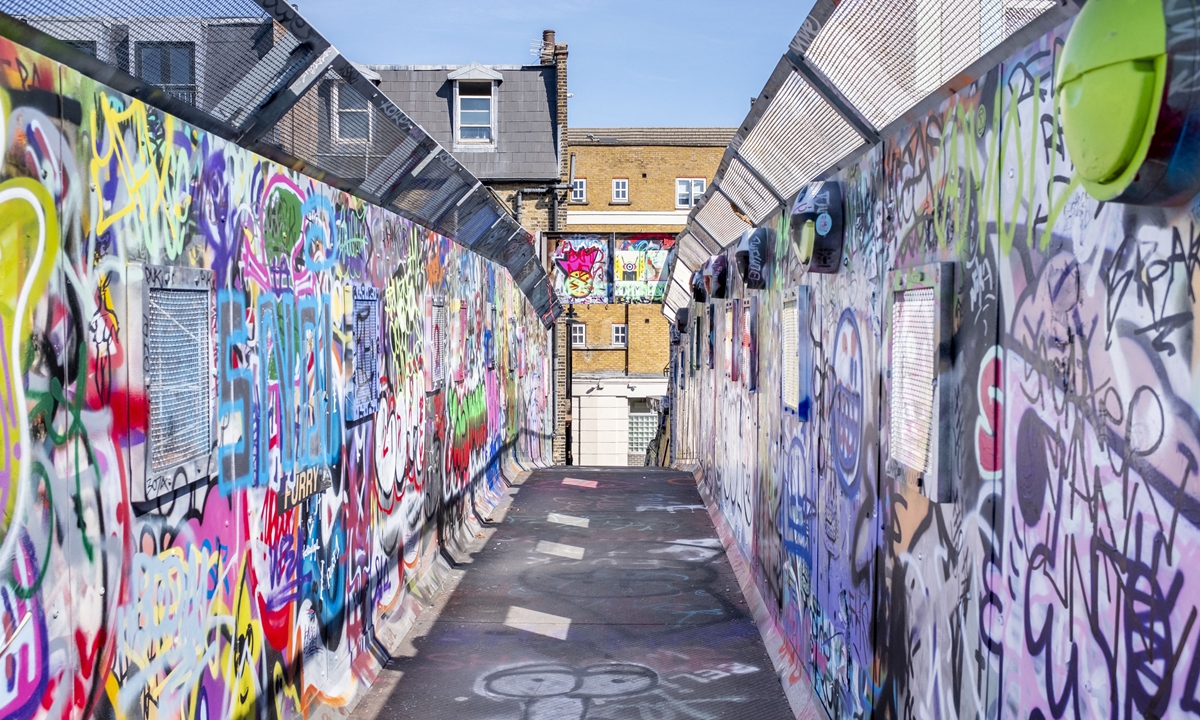
The graffs in the Brick lane streets in Soreditch, London. Photo: AFP
Several Chinese students studying at the Royal College of Art in London spray-painted 12 Chinese words representing the core socialist values on a graffiti wall in Brick Lane, sparking intense discussions. The street art wall was painted white, covering the original artwork, then 12 Chinese characters were spray-painted on the wall in red. A group of opponents later has spray-painted over these words, completely altering the original artwork.
This objectively became a collision incident. As a Chinese, it is difficult for me to not believe that these Chinese students did this with good intentions. The repercussions of this incident are extremely complex, and the subsequent situation was beyond predictions of the students. Considering that they are studying art, their initial considerations for this matter were likely more artistic in nature. However, when this matter was brought into the public opinion arena, the resulting debates were almost entirely political.
Once art encounters politics, it becomes very fragile. Street graffiti is no exception to this logic. In theory, the 12 words representing the core socialist values could hold their ground in the Western world as well. Words such as democracy, freedom, rule of law, and patriotism are well-known worldwide, and they do not even belong to "politics" but rather represent common human values. If the mainstream population in the Western world does not harbor any particular bias, they should be able to maintain an open attitude toward China's core socialist values.
In my opinion, there are many similarities between China's core socialist values and the values of Western society in terms of their original values and moral aspects. It is only through certain political interpretations that they have been set in opposition to each other. In other words, the conflicts and stalemates between China and the West are primarily related to different political backgrounds and implications.
The original intention of these students' street artwork was likely to showcase the value elements of Chinese socialism to the West and test the true extent of Western "freedom of speech." I do not agree with over-interpreting their original intentions. Intense disputes and collisions followed. This street art has not been tolerated in London's graffiti wall. Although the outcome is regrettable, it is not worth making a fuss about.
It seems that sensitivity exists everywhere in the world, and friction is inevitable. Our society should have more resilience toward various frictions, and our collective mentality should be more open and resilient. The Western environment cannot accommodate the display of China's core socialist values. We have learned this, and we should not excessively dwell on the process of collision, especially without becoming discouraged.
We should continue to have confidence in our own core socialist values while also believing that the values of different societies are not as contradictory as this incident may suggest. The basic values of the East and the West, as well as those of China and foreign countries, are interconnected, with commonalities far outweighing their differences. Solidarity is something that the entire human race should strive for, rather than unrestrained opposition and conflict.
The author is a Chinese media professional. opinion@globaltimes.com.cn




